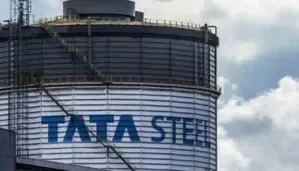Did Tata Steel Receive a Rs 1,902 Crore Demand Notice from Odisha Government?

Synopsis
Key Takeaways
- Tata Steel receives a demand notice of Rs 1,902.72 crore.
- The notice relates to alleged mineral dispatch shortfalls.
- Tata Steel intends to legally challenge the demand.
- Sukinda is a key chromite reserve for Tata Steel.
- The company asserts the demand lacks justification.
Mumbai, July 4 (NationPress) Tata Steel announced on Friday that it has been issued a demand notice amounting to Rs 1,902.72 crore by the Deputy Director of Mines in Jajpur, Odisha.
This notice pertains to an alleged deficiency in the dispatch of minerals from the company’s Sukinda Chromite Block.
In a stock exchange filing, Tata Steel indicated that the demand is founded on a revised assessment of average sale prices as reported by the Indian Bureau of Mines.
The mining authorities sent the notice on July 3 in accordance with Rule 12A of the Minerals (Other than Atomic and Hydrocarbon Energy Minerals) Concession Rules, 2016. They have also initiated the process to utilize the company’s performance security to settle the dues.
“On July 3, Tata Steel Limited received a demand letter from the Office of the Deputy Director of Mines, Jajpur, regarding the revised evaluation of shortfall in mineral dispatch from the Company’s Sukinda Chromite Block, related to the fourth year of the Mine Development and Production Agreement (from July 23, 2023, to July 22, 2024) for an alleged breach of Rule 12A of the Minerals (Other than Atomic and Hydrocarbon Energy Minerals) Concession Rules, 2016, and the potential appropriation of performance security,” the company detailed in its filing.
“The revision in assessment is anchored on the declaration of average sale price set forth by the Indian Bureau of Mines,” the company further noted in its filing.
The mineral dispatch shortfall reportedly occurred during the fourth year of Tata Steel’s mining agreement, spanning from July 23, 2023, to July 22, 2024, under the Mine Development and Production Agreement (MDPA) for the Sukinda block.
Tata Steel has contested the demand, asserting that the claim lacks justification or adequate basis, and it intends to challenge the notice through legal avenues.
“The Management believes that the State's demands are not justified and lack substantive foundation,” the firm stated.
“Therefore, the company will seek appropriate legal remedies before the relevant judicial or quasi-judicial forums,” the company added.
Sukinda, located in Odisha’s Jajpur district, is among the largest chromite reserves in India and is essential to Tata Steel’s supply of raw materials.









